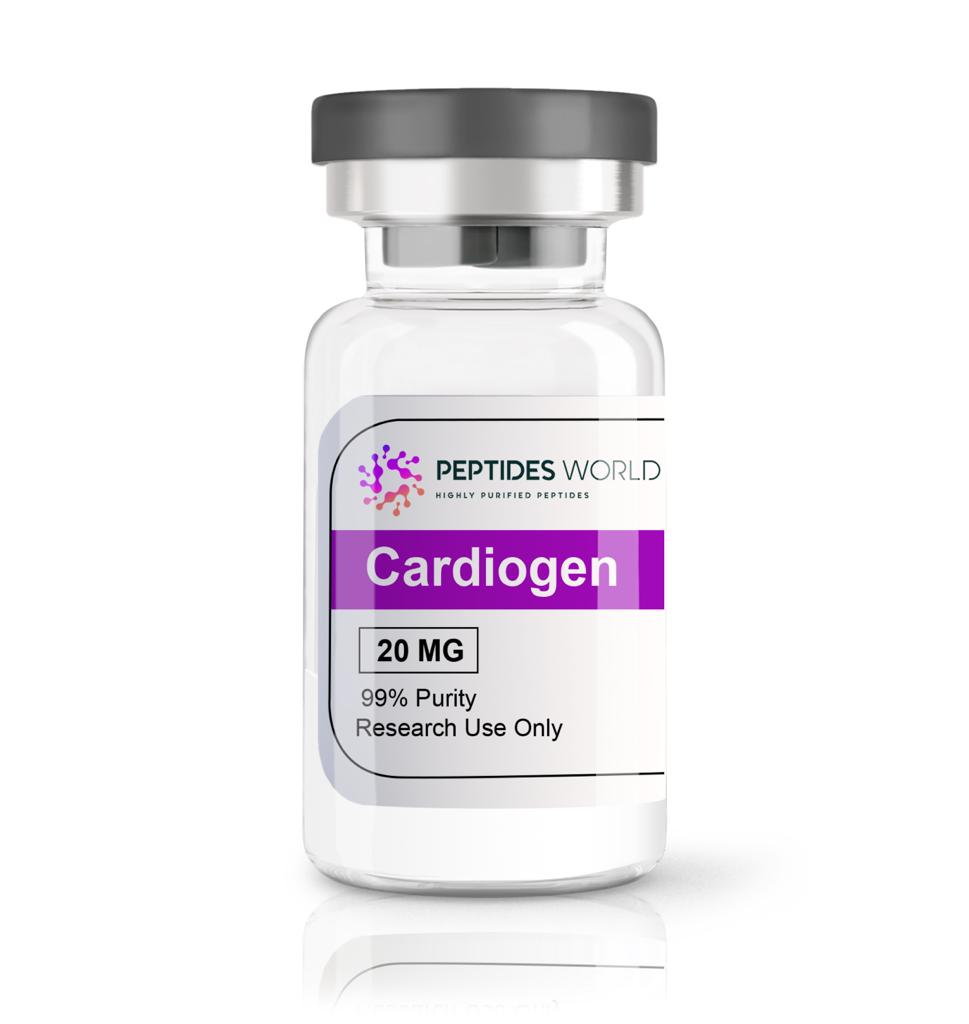Legal Notice Regarding This Product
THIS PRODUCT IS STRICTLY INTENDED FOR RESEARCH USE ONLY. It is designated solely as a research chemical. Usage is confined to in vitro testing and laboratory experimentation exclusively. Information available on our website about this product is for educational purposes only and should not be interpreted as an endorsement or directive for use outside these bounds. Introducing this product into humans or animals by any route is strictly prohibited by law. Handling of this product should be undertaken only by licensed, qualified professionals.
This product is not to be used as a drug, food, or cosmetic. Misbranding, misusing, or mislabeling this product as a drug, food, or cosmetic is illegal. Users are responsible for complying with all applicable laws and regulations regarding the handling and use of this product.
HIGHLIGHTS:
- Cardiogen seems to stimulate cardiomyocyte proliferation. [1]
- Apoptosis levels are higher in tumor cells [2]
- Cardiogen studied as cancer treatment [3]
- Prostate Cancer

Molecular Formula: C18H31N7O9
Molecular Weight: 489.5g/mol
The effect of the amino acids and cardiogen on the development of myocard tissue culture from young and old rats [1]
The effect of 20 amino acids and the synthetic tetrapeptide cardiogen in concentration 10(-12) M was investigated in organotypic tissue culture on the cell proliferation and apoptosis development in myocard tissue explant in 3- and 24-months old rats. 7 of 20 amino acids stimulated the cell proliferation in the young rats. In the same time, only 2 amino acids were active in myocard culture from the old rats. The tetrapeptide cardiogen demonstrated the great stimulating effect on the proliferation both in tissues from young and old rats. The immunohistochemical study demonstrated a decrease of the p53 protein expression by cardiogen action. This fact can testify that cardiogen inhibits the apoptosis process in the myocard tissue.
Tumor-Modifying Effect of Cardiogen Peptide on M-1 Sarcoma in Senescent Rats [2]
The tumor-modifying effect of cardiogen peptide was studied on rats with transplanted M-1 sarcoma. The level of apoptosis of tumor cells after cardiogen injections in all experimental groups was higher than in the control. The dose-dependent inhibition of M-1 sarcoma growth after injection of cardiogen was caused by the development of hemorrhagic necrosis and stimulation of tumor cell apoptosis. The parameters of proliferative activity indicate that inhibition of tumor growth was not caused by the direct cytostatic effect of the drug on the tumor. Morphological signs indicate a specific mechanism of cardiogen action, realized through the vascular network of the tumor.
Cardiogen and Prostate [3]
The direct relationship between the aging process and the incidence and prevalence of both benign prostatic hyperplasia (BPH) and prostate cancer (PCa) implies that certain risk factors associated with the development of both diseases increase with the aging process. In particular, both diseases share an overly proliferative phenotype, suggesting that mechanisms that normally act to suppress cellular proliferation are disrupted or rendered dysfunctional as a consequence of the aging process. We propose that one such mechanism involves changes in the prostate microenvironment, which ‘evolves’ during the aging process and disrupts paracrine interactions between epithelial and associated stromal fibroblasts. We show that stromal fibroblasts isolated from the prostates of men 63-81 years of age at the time of surgery express and secrete higher levels of the CXCL12 chemokine compared with those isolated from younger men, and stimulate CXCR4-mediated signaling pathways that induce cellular proliferation. These studies represent an important first step towards a mechanistic elucidation of the role of aging in the etiology of benign and malignant prostatic diseases.
The effect of short peptides T-32, T-38 and cardiogen on the expression of signaling factors of the differentiation of human prostate’s fibroblasts (PFM), which are the main cells of its microenvironment–protein CXCL12, WEDC1 and ghrelin in aging cultures has been studied. Confocal laser microscopy has demonstrated that all the investigated peptides possess the ability to actively enhance the expression of the above markers, whose synthesis significantly reduced in senescent cultures. It has been shown that the rate of expression of the studied factors in older cultures (after 7 passages) under the action of the peptides have a tendency to even higher than those of controls (young culture, after 1 passage). Thus, peptide T-38 is the most active among the investigated ones. These studies show promise for detailed development of methods of peptides’ regulation of aging and age-correction of violations of functioning of the prostate gland.
- Chalisova NI, Lesniak VV, Balykina NA, Urt’eva SA, Urt’eva TA, Sukhonos IuA, Zhekalov AN. [The effect of the amino acids and cardiogen on the development of myocard tissue culture from young and old rats]. Adv Gerontol. 2009;22(3):409-13. Russian. PMID: 20210190.
- Levdik NV, Knyazkin IV. Tumor-modifying effect of cardiogen peptide on M-1 sarcoma in senescent rats. Bull Exp Biol Med. 2009 Sep;148(3):433-6. English, Russian. doi: 10.1007/s10517-010-0730-9. PMID: 20396706.
- Begley L, Monteleon C, Shah RB, Macdonald JW, Macoska JA. CXCL12 overexpression and secretion by aging fibroblasts enhance human prostate epithelial proliferation in vitro. Aging Cell. 2005 Dec;4(6):291-8. doi: 10.1111/j.1474-9726.2005.00173.x. PMID: 16300481.
- Kheĭfets OV, Poliakova VO, Kvetnoĭ IM. [Peptidergic regulation of the expression of signal factors of fibroblast differentiation in the human prostate gland in cell aging]. Adv Gerontol. 2010;23(1):68-70. Russian. PMID: 20586252.
Cardiogen-20mg
$59.90

